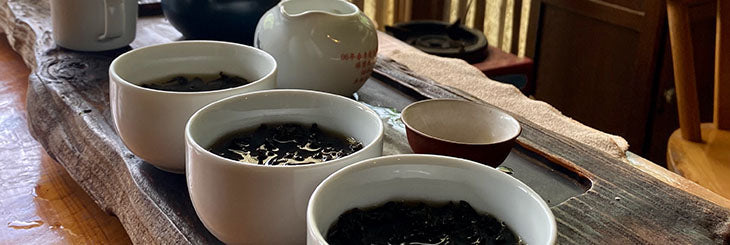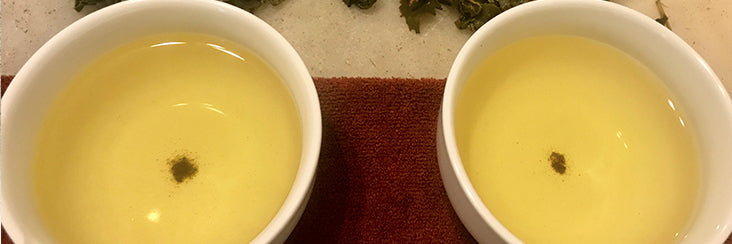News

Eco-Farmed GABA Oolong Tea | Summer 2021
Our source of Eco-Farmed GABA Oolong Tea has been the most inspiring representative of natural tea farming we've met. He inherited his family tea farm and factory 20 years ago, and has persevered in creating a sustainable production of organic tea by developing natural tea farming methods on his own.

Shan Lin Xi High Mountain Oolong Summer Harvest
We brewed our spring batch of Shan Lin Xi High Mountain Oolong Tea alongside the freshly picked summer batch to observe the differences between these two consecutive harvests from the same source. These two batches exhibited the classic seasonal traits of spring and summer high mountain tea.

Li Shan High Mountain Oolong Winter 2020
This year's winter batch is closer to the classic Li Shan High Mountain Oolong in that it is less oxidized than our recent batches from this source. Minimal oxidation offers more aromatic complexity, and a more delicate and fresh flavor profile. Watch the video below for a detailed tasting of this new batch in comparison with the previous fall batch of tea, as well as last winter's batch — all from the same farm, made by the same craftsmen.

Shan Lin Xi High Mountain Oolong Fall 2020
In the end, each seasonal crop has its own unique combination of contributing factors that give it a slightly different aromatic and flavor profile than other seasons. We really enjoy experiencing these seasonal variations from the same plot of tea processed in the same basic way. We encourage our High Mountain Oolong fans to follow suit in order to more fully understand this type of tea and how it can vary from season to season.

Tie Guan Yin Oolong Spring Tea Is Here!
Over the course of our chat, catching up on spring harvest, competition, and other tea related topics, we realized that this artisan of Traditional Tie Guan Yin Oolong is the single most patient and painstaking tea maker we know. The amount of time and serious labor he puts into making a very minimal amount of tea is just so far off the charts of any other type of tea production we've seen. Oh, and he won first place prize a year and half ago, amidst top 2% and top 10% prizes that he is awarded consistently in the Muzha Farmers' Association Traditional Tie Guan Yin Oolong Tea competition.

How To Make Gourmet Iced Tea: Quick And Easy
The best loose-leaf iced tea in 3 easy steps
- Brew your tea at a ratio of 1:40, loose-leaf tea : water. Boiling temp. water. Brew 7 minutes.
- Pour the brewed tea into a a cocktail shaker full of ice and shake
- Pour the well shaken iced tea into glasses half-full of ice cubes

Comparing Seasonal Batches Of Loose Leaf Oolong Tea
The inspiration for this post began when we first tasted our spring batches of tea this year. Especially for the three teas that we'll take a look at here, we immediately thought upon tasting each of them, they are noticeably different from last winter's batch. So first, let's list the main points to observe in comparing seasonal batches from the same source of tea.

Eco-Cha Tea Tasting At Google
Sourcing director Andy Kincart visited Google in San Francisco last week for an informal tea tasting with the staff in their Conscious Café. Eco-Cha teas have been served to the Google team in San Francisco since last year.
- 1
- 2

